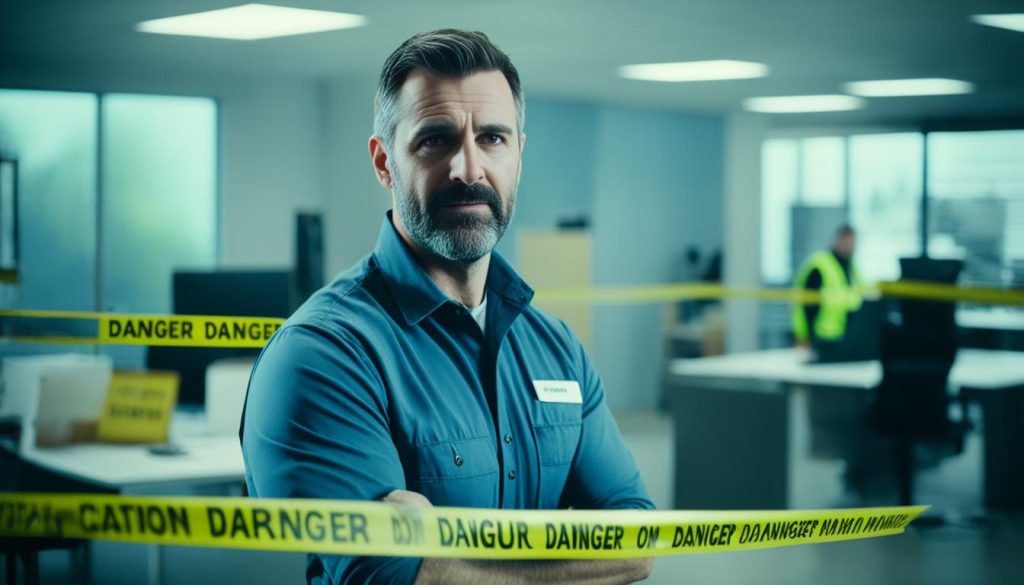Your safety and well-being should always come first at work. But, accidents and injuries can still happen, leading to physical, emotional, and financial problems. Luckily, you have legal rights to protect you if you get hurt at work1. Laws like the Occupational Safety and Health Act (OSHA) make sure you work in a safe place without known dangers1. You can report unsafe conditions, get the right safety training and gear, and file workers’ compensation claims without fear of getting in trouble1.
Knowing your rights as an injured worker is key to getting the help and money you need. By learning about your rights and getting help from a skilled workers’ compensation lawyer, you can deal with the legal stuff and look out for yourself2. The workers’ compensation program gives you money for medical bills and lost pay, even if you’re not sure who caused the accident2. Your boss can’t legally bother, threaten, or try to stop you from getting these benefits2.
Key Takeaways
- You have the right to a safe workplace free of known hazards under federal law.
- You can report unsafe conditions and request an OSHA inspection without fear of retaliation.
- Workers’ compensation benefits can cover medical costs and lost wages, regardless of fault.
- Employers cannot legally prevent you from filing a workers’ compensation claim.
- Seeking legal representation can help ensure your rights are protected during the claims process.
- Protecting Your Rights in Workplace Injury Cases
Understanding Your Rights as an Injured Worker
As an employee, you have important rights and protections under federal law. The Occupational Safety and Health Administration (OSHA) provides these. These rights help make sure your work is safe and protect you if you get hurt at work3.
OSHA Worker Rights and Protections
Your employer must keep your work area safe. This means giving you safety training in a language you can understand and the right personal protective equipment (PPE) for your job3. You can also report unsafe conditions to OSHA without fear of getting in trouble3. It’s important to know and use these rights to keep yourself safe at work.
Receiving Workplace Safety Training and Equipment
Your employer must give you the safety training and PPE you need for your job3. This is the law and also helps prevent injuries and illnesses. If you think your employer isn’t doing enough for safety, you can talk to them or get help from OSHA3.
Your safety and well-being should always come first at work. By knowing your rights and helping keep the workplace safe, you protect yourself and your coworkers from harm3.
“Employers in every state are required to provide employees with a reasonably safe work environment, yet work-related injuries still occur.”3
If you get hurt at work, tell your employer right away and learn about workers’ compensation. You have rights as an injured worker that go beyond the first injury. Knowing how to deal with the system helps you get the benefits and support you deserve435.
Filing Workers’ Compensation Claims and Avoiding Retaliation
When a workplace injury happens, workers can file for workers’ compensation to get medical help and lost wages6. But, some bosses might try to punish workers for making claims6. Florida law says bosses can’t fire, threaten, or scare workers for making claims6. If a boss does this, the worker can take legal action6. A lawyer for workers’ compensation can protect your rights and fight against unfair actions.
Protecting Your Rights in Workplace Injury Cases
In California, bosses can’t punish workers for filing workers’ compensation claims6. If a boss breaks this rule, the worker could get more money, up to $10,0006. Workers who win can get their job back, get paid for lost wages, and get back work benefits6. They can also sue for wrongful firing if it’s because they made a workers’ compensation claim6.
California laws protect workers from being fired or treated unfairly for reporting work injuries6. If a worker wins a claim, they could get more money and other benefits6. This rule covers more than just being fired, like getting a pay cut or being overlooked for a promotion6. This rule helps all workers who are hurt on the job6.
No Employer Retaliation for Valid Injury Claims
Winning a claim can mean getting more money, getting your job back, and getting paid for lost wages6. This claim is different from a regular workers’ compensation claim and is defended by the boss6. Workers must file this claim within a year after being fired or treated unfairly6. Winning this claim can affect other lawsuits, like a claim for wrongful firing6. These lawsuits can cover lost wages, emotional pain, and legal fees6.
In California, it’s illegal for bosses to retaliate against workers for doing things they’re allowed to do, like filing claims7. The worker has to prove the boss acted unfairly7. Workers don’t have to show the claim was the main reason for the boss’s actions, but they must show it was a big part of it7.

To prove a boss retaliated against them, workers must show they were entitled to workers’ compensation, took part in a protected activity, faced job problems, and the boss acted because of that7.
Common Workplace Injuries and Hiring a Workers’ Comp Attorney
Workplace injuries can be many things, like broken bones, muscle and joint issues, and even illnesses from harmful substances8. These injuries can happen to anyone, no matter their job8. They can range from physical injuries like fractures and cuts to illnesses from toxic substances8.
Repetitive tasks often lead to injuries like carpal tunnel syndrome8. People can also get sick from their work, causing problems with breathing, skin, and hearing8.
Workers can file for workers’ compensation to get medical help and lost wages9. In 2020, there were 2.7 million workplace injuries and illnesses9. Back injuries were a big issue, especially in construction jobs, according to the Pennsylvania Department of Labor and Industry’s report9.
But, the process of filing a claim can be tough, and some claims get denied10. Employers or insurance companies might not accept valid claims10. Many workers don’t appeal these decisions.
Getting a workers’ compensation lawyer is key to getting the right benefits and protecting your rights10. These lawyers work for a small part of the settlement amount10. They make sure the settlement is fair.
For serious injuries or illnesses, you might need a lawyer’s help10. If you have a permanent disability, you could get weekly payments or a big payment for lost wages.
| Workplace Injury Type | Frequency | Impact |
|---|---|---|
| Back Injuries | 9Over 11% of workplace accidents in Pennsylvania in 2020 | Significant in the construction industry, according to the Pennsylvania Department of Labor and Industry |
| Repetitive Strain Injuries | 8Common among individuals performing repetitive tasks | Include carpal tunnel syndrome, tendonitis, and bursitis |
| Occupational Illnesses | 8Caused by exposure to harmful substances or environments | Can lead to respiratory issues, skin ailments, and hearing impairment |
Reporting a workplace injury quickly is key for a strong case later.8 Filing for workers’ compensation can lead to denials, partial benefits, and delays, causing financial stress8. A lawyer is crucial for handling work injury claims8.
Lawyers make sure you get all the benefits you deserve, like medical costs, lost wages, and help for permanent disabilities8. They also consider future costs, like ongoing medical care and home changes.
10 “Employers and workers’ compensation insurers regularly reject valid workers’ comp claims, with many workers failing to appeal.”
8 Lawyers guide you through the legal process, handle personal injury claims, and represent you in court8. They make sure you meet deadlines and deal with insurance companies well8. They use expert witnesses and gather evidence to prove your case.

Appealing a Denied Workers’ Compensation Claim
Workers’ compensation claims can sometimes be denied by employers or their insurance companies11. If this happens, workers can appeal the decision. They need to file a petition with the Division of Administrative Hearings. A judge will then review the case12. A workers’ compensation attorney can help by collecting medical records and expert witness statements. They aim to build a strong case to get the worker’s benefits13.
Presenting Evidence and Expert Testimony
To make a strong appeal, you need to present evidence like medical records and witness statements13. It’s important to get help from medical experts. They can prove the injury or illness was work-related11. Their opinions can also challenge any disputed medical evidence.
Countering Employer and Insurance Company Denials
Insurance companies or employers might deny claims for reasons like incomplete paperwork or a pre-existing condition12. A skilled attorney can fight these denials by providing more evidence. They can show the employee is eligible for benefits13. This might mean getting more documents or witness statements.
Appealing a denied claim can be tough, but with the right lawyer, workers have a better chance of winning12. Working with an experienced attorney gives employees confidence in their fight for benefits. They can ensure they get what the law says they should have12.

“Hiring a workers’ compensation attorney can significantly increase the chances of success in appealing a denied claim.”
Conclusion
Workplace injuries can be very tough, both on your body and your wallet. But, you have legal rights to help you out14. It’s often key to work with a skilled workers’ compensation lawyer to get through the claims process and protect your rights14. This way, you can focus on getting better while making sure you get the benefits you need.
In California, you can take legal action against your employer under certain conditions15. These include cases of intentional harm, hiding injuries, injuries from faulty products, or not having workers’ compensation insurance15. Employers must have workers’ compensation insurance. You can go for workers’ compensation or sue your employer, which affects how much you can get paid15.
It’s vital to protect your rights after getting hurt at work16. Picking the right medical place, keeping your medical records safe, and making sure your doctor keeps things confidential are key steps16. With the right lawyer’s help, you can handle the workers’ compensation system and get the compensation and support you deserve.
FAQ
What are my rights as an employee if I’m injured at work?
You have rights under federal law, like the Occupational Safety and Health Act (OSHA). This law makes sure your workplace is safe. You can report unsafe conditions, get safety training, and file workers’ compensation claims without fear of being punished.
What are my OSHA worker rights and protections?
OSHA gives you important rights. You have the right to a safe workplace and to understand safety training. You also get the right to proper safety gear for your job. Plus, you can report unsafe conditions to OSHA without worrying about getting in trouble.
Can my employer retaliate against me for filing a workers’ compensation claim?
No, Florida law says your employer can’t fire, threaten, scare, or force you for filing a workers’ compensation claim. If they do, you can take legal action.
What types of workplace injuries are covered by workers’ compensation?
Many injuries happen at work, like broken bones, muscle and joint injuries, and repetitive motion injuries. Even illnesses from toxic substances are covered. You can file a workers’ compensation claim for medical care and lost wages.
What can I do if my workers’ compensation claim is denied?
If your claim is denied, you can appeal. You’ll file a petition with the Division of Administrative Hearings. A judge will then review your case. A workers’ compensation lawyer can help by gathering medical records and expert opinions to fight the denial.
Source Links
- OSHA Worker Rights and Protections
- I Was Injured at Work. What Are My Rights?
- I Was Injured at Work. What Are My Legal Rights?
- Injured employee FAQ
- Understanding Your Rights: A Guide to Workplace Injury Lawyers | OCNJ Daily
- Workers Compensation Retaliation – Wrongful Termination or Discrimination for Bringing a Claim
- AN INJURED EMPLOYEE’S GUIDE TO EMPLOYER RETALIATION
- Why You Need a Workplace Injury lawyer – Lawisland
- Pros & Cons of Hiring a Workers’ Comp Lawyer | Munley Law Personal Injury Attorneys
- Should I Hire a Workers’ Comp Attorney, or Can I Handle My Own Case?
- Workers’ Compensation: A Guide to Protecting Your Rights and Navigating Claims – Donaldson & Weston
- Why Was My Workers’ Compensation Claim Denied? Top 9 Reasons
- How to Appeal a Workers’ Compensation Decision in Virginia
- The Importance Of Hiring A Workers Comp Lawyer: Protecting Your Rights And Interests – LeFante Law Office P.C.
- Knowing Your Rights: When Injured Workers Can Sue Their Employers in California
- What NOT to Do In A Workers Comp Case – Kirkpatrick Injury Law

